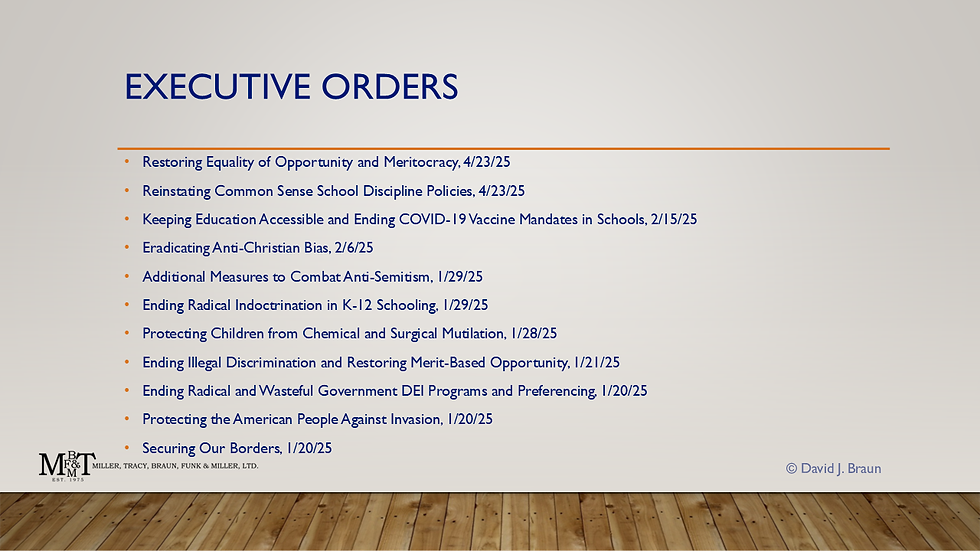The Changing Educational Legal Landscape
- BEAC

- Jun 9, 2025
- 3 min read
Updated: Jun 11, 2025
David J Braun, J.D. provided legal updates for attendees at BEAC’s 4th Annual Equity Conference. He is a partner at Miller, Tracy, Braun, Funk & Miller, Ltd. and adjunct faculty at Illinois State University in the College of Education. Mr. Braun focuses his practice in the area of Illinois schools, universities and education law, and has developed significant experience in the field serving clients in matters of labor management, collective bargaining, grievance arbitration, employment and student discrimination, and student discipline and management.
With the rapid changes occurring in education at the federal level, many educators have questions about what they should be doing around diversity, equity, and inclusion initiatives. Mr. Braun’s session was so helpful we want to provide a high-level summary of his presentation to all our members.
This article is not a substitute for legal advice. If you, your school, or your district would like more information, please contact Mr. Braun directly at dbraun@millertracy.com or 217.762.9416 x 1005 or 217.898.5172.
Surviving Executive Orders: Staying Calm While Refreshing Twitter
With tens of Executive Orders, persistent litigation, and federal enforcement and funding in flux, it is a stressful time for administrators confronted with how to implement changes to rules when the state and federal governments do not agree what the laws are or should be. Those administrators that thrive during this complex time will remember the following; we have been here before, and surviving conflict has common themes:
1. Stay with the pack. The first gazelle and last gazelle out onto the tundra become food for the cheetahs. Gazelles that stay with their friends are safest.
2. Embrace difficult. Those who are sure are rarely right, and those who are right are rarely sure. Complicated issues require complicated solutions.
3. Seek balance. Schools must plan for the long haul. Wins today may cause losses tomorrow (and vice versa).

School administrators are employed by elected or appointed boards. Boards change frequently, and change is often predicated by challenge or attack of a perceived norm. Moreover, while Illinois is legislating to “trump-proof,” the state administrations come and go. The best solutions will be built and marketed for both the boards of today and those of tomorrow (with moderation for each). Schools must remain a safe place for all students to learn, both because a safe learning environment is the most important charge of a school, but also because schools lose their purpose (and funding for their purpose) when students do not show up to school.
It is also important to remember that:
Illinois State Board of Education is the primary curricular authority. As such, it sets the standards and guidelines for content and policies for all schools. As a result, ISBE is best positioned to challenge executive orders as they relate to education in Illinois.
The local School Board is the governing body and has the authority to bring lawsuits, not an individual school.
Boards that want to challenge the Trump administration should be mindful that legal action is costly and require significant resources.
For administrators: know the boundaries of your district and your own school’s rules.
It is likely that many of the Executive Orders exceed the scope of authority of the Executive Branch of the federal government. See, National Education Association et al v. United States Dept. of Ed., 1:25-cv-00091-LM (April 24, 2025), and National Association of Diversity Officers in Higher Education, et al. v. Donald J. Trump, et al., Case No. 1:25-Cv-00333-ABA (D. Md. 2025), among others. Yet the purpose may not be enforcement, but rather to create “self-correction” by causing immigrants to flee, schools to eliminate programs aimed to improve diversity, equity, and inclusion, and organizations in all walks of life to examine their budgets to determine if better efficiencies can be achieved. Whether executive authority exists may miss the point where self-correction serves the same purpose.

Solutions to avoid trouble are as much a function of paying attention to a school’s population and neighborhood and how an administrator can ensure a) that students continue to see school as a safe place (without challenging federal or state authority publicly), and b) that the school continues to improve its responsiveness to challenges in educational capacity. Whether viable solutions will include shoring up investigative processes, renaming processes to better reflect the work of ensuring fair access for everyone, or seeking additional or alternative funding sources for the hard work of educating children, schools’ best defense against a challenging world will be, as it has always been, to focus on the things schools do best – finding new and creative ways to educate the next generation of eager learners. We are here to help whenever we can.




Comments